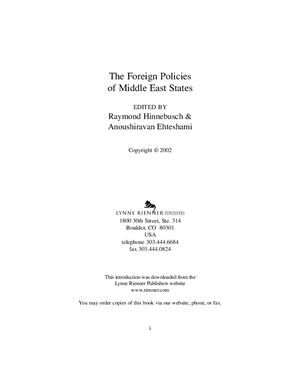The Foreign Policies of Middle East States by Raymond Hinnebusch &
Anoushiravan Ehtesham
This book takes a modified form of realist theory as a working hypothesis.*
It assumes that in the Middle East the state is the main
actor in foreign policy and that state elites have an interest in maximizing
the autonomy and security of the state. It accepts the realist claim
that a built-in feature of a state system, anarchy, has generated profound
insecurity and a pervasive struggle for power. Indeed, the Middle East
is one of the regional subsystems where this anarchy appears most in
evidence: it holds two of the world’s most durable and intense conflict
centers, the Arab-Israeli and the Gulf arenas; its states are still contesting
borders and rank among themselves; and there is not a single one
that does not feel threatened by one or more of its neighbors. Finally,
the book accepts that states seek to counter these threats through reason
of state, notably power accumulation and balancing, and that the
latter is a key to regional order.
This book takes a modified form of realist theory as a working hypothesis.*
It assumes that in the Middle East the state is the main
actor in foreign policy and that state elites have an interest in maximizing
the autonomy and security of the state. It accepts the realist claim
that a built-in feature of a state system, anarchy, has generated profound
insecurity and a pervasive struggle for power. Indeed, the Middle East
is one of the regional subsystems where this anarchy appears most in
evidence: it holds two of the world’s most durable and intense conflict
centers, the Arab-Israeli and the Gulf arenas; its states are still contesting
borders and rank among themselves; and there is not a single one
that does not feel threatened by one or more of its neighbors. Finally,
the book accepts that states seek to counter these threats through reason
of state, notably power accumulation and balancing, and that the
latter is a key to regional order.

